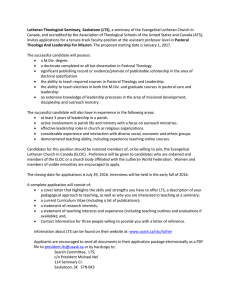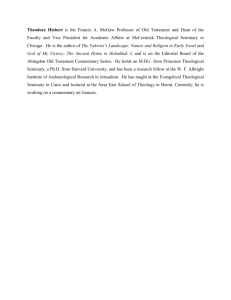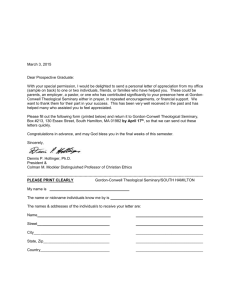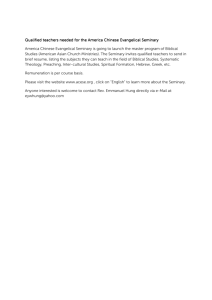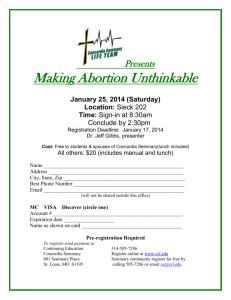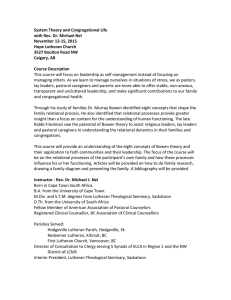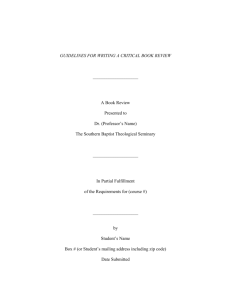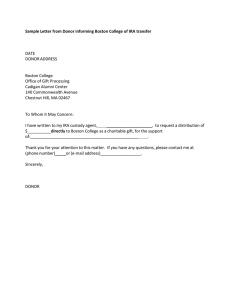Lutheran Theological Seminary Saskatoon
advertisement
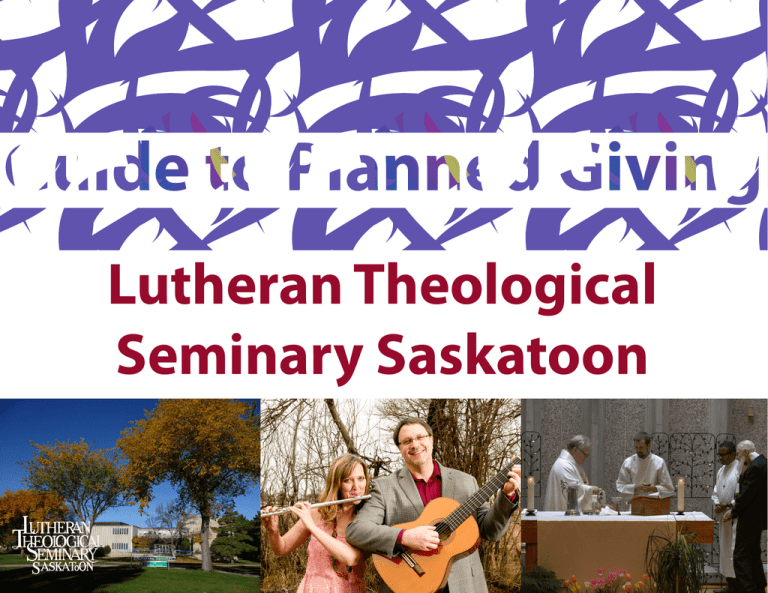
Lutheran Theological Seminary Saskatoon Lutheran Theological Seminary Saskatoon (LTS) equips nurtures and challenges women and men for Christ-centered ministries that call people to lively commitment, bold witness and sacrificial service. LTS seeks to form the present and future leadership of the Church for the world. We provide solid footings for teaching competent church leaders for Western Canada and for the wider church. 1913 Lutheran College and Seminary founded by the Evangelical Lutheran Synod of Manitoba and Other Provinces; by 1915, a facility was built at 1502 8th St E in Saskatoon 1939 Luther Theological Seminary established by the Norwegian Lutheran Church of America (eventually situated at 212 Wiggins Ave N) 1968 The two predecessor seminaries – with six professors and thirty students – joined to become Lutheran Theological Seminary Saskatoon and moved to a new building on the University of Saskatchewan campus, on the banks of the South Saskatchewan river 1969 LTS, Emmanuel & St Chad (Anglican), and St. Andrew’s College (United) established a Graduate School of Theology, later known as the Graduate Theological Union of Saskatoon. Also this year, Deaconess Margaret Tsan became the first woman graduate 1996 Rev. Dr. Faith Rohrbough installed as the first woman President of a Lutheran seminary in North America 2003 First cross-cultural immersion trip (to India) 2009 First graduate from the Diaconal Certificate program (Gretchen Peterson) 2012 Faithful for the Future capital campaign launched 2013 Distance education program begins offering classes to students outside Saskatoon Over 1200 of our graduates have served parishes in the ELCIC and ELCA Our seminary embodies a distinctive Canadian Lutheranism even as we honour the diversity of today’s world. Students are called to expand their world through four specialized areas: globalization ethics rural ministry mission The LTS cross-cultural program teaches the skills of social analysis and self-awareness that are needed for ministry in a burgeoning cultural mosaic such as Canada. Traditional core areas, such as liturgy and homiletics, Lutheran confessions, biblical exegesis, and pastoral care also continue to be stressed. Ordained professors with parish and international mission experience build on their own training and experiences when preparing our students for ministry and church leadership. In the context of the Saskatoon Theological Union (STU), our students learn Lutheran perspectives and practices of worship, study, and work in a multi-denominational setting. This training equips pastors and rostered leaders to handle the issues that now face many parishes. Formation in an ecumenical context also brings clarity about our own unique and complex Lutheran confessions. LTS offers a range of theological education degrees and certificate programs, on-campus and by distance: == Master’s of Divinity (MDiv) – preparation for ordained ministry [4 years including parish residency] == Master’s of Theological Studies (MTS) – advanced theological study for lay leadership and church vocations that do not require ELCIC rostering [2 years] == Lutheran Formation Certificate – Lutheran formation for students holding an MDiv from another denomination who wish to become ordained through the ELCIC == Diaconal Ministry Certificate – preparation for diaconal ministries [1 year + internship] == Master’s of Sacred Theology (STM) – advanced graduate study for students already holding an MDiv or MTS degree, often as preparation for a PhD in Theology == Doctor of Divinity (DMin) in Rural Ministry and Community Development – advanced practical graduate degree for clergy In recent years, the two ELCIC seminaries (LTS & Waterloo) jointly have graduated an average of ten students for ordained ministry per year. At this rate, the demand for future ELCIC pastors will not be met. Already, many Canadian parishes, particularly in rural and remote areas, lack any rostered leadership or pastor. We envision a future in which our grandchildren and their children will be able to worship in a strong, vibrant ELCIC. The success of LTS will be critical for filling this need. Adequate funding will strengthen our teaching mission by increasing our capacity to attract and retain top professors, recruit strong students, and upgrade our facilities. Professors Planned Giving Staff Rev. Dr. Kevin Ogilvie President Rev. Dr. Gordon Jensen William Hordern Chair of Theology Joe Stolee Director of Development joe.stolee@usask.ca 403.478.9684 Rev. Dr Cameron Harder Professor of Systematic Theology Dr. Pamela Giles Dir. of Advancement Services development.office@usask.ca 306.966.7846 Rev. Dr. Kristine Ruffatto Associate Professor of Old Testament Studies Vincent Gaudet Director of Finance finance.lts@usask.ca 306.966.7862 BC Bishop Greg Mohr ’82 Rev. Christoph Reiners ’94 Dr. Gerry Saleski SK Bishop Sid Haugen ’81 Rev. Dan Haugen ’73 Helga Hein ABT Bishop Larry Kochendorfer ’89 Rev. Doug Heine Marla Mulloy (Chair) MNO Bishop Elaine Sauer ’98 Rev. Lester Skonnord ’83 Sandra Tymchyshyn 1% Tuition & Fees 21% Donations & Bequests* 17% Dormitory 43% Provincial & Synodical Grants 17% Investment Income Sources of LTS Revenue from the 2012–13 audited financial statement Because your gifts make a difference. The generous support of our individual and congregational donors is essential for LTS to offer the excellent training of pastors, diaconal ministers, and church workers that it has been privileged to provide. Because our mission furnishes your church. Almost all the Lutheran ordination-track graduates from recent years have gone on to serve in parishes in the ELCIC. Because our programming enriches and deepens the scope of the ELCIC. Along with a strong MDIV program, LTS offers clergy, diaconal, and lay training programs, welcoming students of other denominations and from other countries. Through the ecumenical learning context, students gain a deeper understanding of what it means to be Lutheran, while learning to appreciate about other traditions. LTS is unique in the importance it places upon a cross-cultural, globalized understanding of the Lutheran Church and our faith. Because we are called by Christ to be stewards of his church. Part of this call to stewardship is a responsibility to maintain and propagate the church of God, which will in turn spread the good news. We cannot fulfill this mission without a constant flow of new pastors into the ELCIC. The Seminary is a partner in the future of this church. You are invited to become a vital partner in this important ministry of our Church. First, we ask for your prayer support for us and in sharing the news of this ministry with others. =If = you are sensing a call to study ministry, consider enrolling =Encourage = others who may be sensing a call to ministry =Give = a major gift or become an ongoing donor =Make = arrangements for a legacy gift to the Seminary. The opportunity is yours to have a significant role in this vitally needed ministry now and in the future. What They Are Planned or legacy gifts are future donations to a charity such as LTS, given through a will or other form of designation. Every legacy gift, regardless of the amount, is valuable to the Seminary. Why Create a Legacy Gift? Everyone has their own reasons for choosing to create a legacy gift: ==It can be a way to ensure that your memory lives on ==It can be a way to ensure that LTS is able to continue its important work of training future leaders for the church ==It can be a way to reduce the tax burden that comes with the transfer of one’s estate to surviving relatives When you create a legacy gift, you are making a significant contribution to the future of the church. Take the time to consider your options carefully. Planning your gift in consultation with your family, financial advisor, or lawyer will help ensure that your wishes will be carried out after you yourself are gone. What They Are Remembrance of LTS by a capital gift through a will or trust How They Work the Donor… ==Directs the executor of the will to pay fixed amount or percentage to charity ==Retains right to change amount or to change charity ==Allows the donor to continue to help LTS after death ==Can create a memorial, designate a specific ministry within the Seminary, or establish an ongoing fund the Seminary… ==Receives a capital gift upon death of donor ==Is able to maintain and grow the work of the Seminary Benefits ==Allows tax credit to estate when gift is paid out ==Bequest may be changed at any time ==Donor retains principal and income during lifetime Points to Consider ==Full tax credit may not be utilized ==Can be challenged by heirs annuity to provide income payments to you for a certain duration or for the Transfer of cash or property to a finanrest of your life cial organization, which then provides an immediate gift to the Seminary and a ==Most appealing for those who have reached or are close to reaching guaranteed income for the donor retirement age and prefer to make a gift now rather than leave a bequest How They Work ==The specific amount of income you Benefit would receive depends on your age ==Donor can make a gift during their and prevailing interest rate lifetime and receive a guaranteed ==Payments can be arranged for income monthly, quarterly, or semi-annually ==Donor receives a charitable tax Point to Consider receipt for the donation portion ==Your capital is no longer available for ==Can be set up as a joint or individual your own use What They Are What They Are Benefits ==Gifts of publicly listed securities ==Donor receives an attractive tax credit* to the charity ==No capital gains tax is paid How They Work directly on donations of Donor appreciated securities. [If one ==Arranges for transfer of share were to sell the appreciated ownership to LTS shares oneself, one would pay tax ==Receives a tax receipt for the on 50% of the increase in value value of the shares the day LTS since originally purchased.] receives them ==Charitable tax receipt given for Charity the full value of the donated ==Sells the shares immediately and shares has cash available for use ==Gifted securities in one’s will can help reduce taxes on the estate in the year of the donor’s death *To receive the tax advantage, the donation of securities must be made in a certain way. The Seminary and your broker can provide the information you need to make the process easiest for you. What They Are ==RRSPs and RRIFs provide stable income during a person’s retirement ==These assets are taxable when paid out Benefits ==If you have no surviving spouse or dependent child, these funds can produce a large tax liability in the year of your death. Gifting the funds to LTS can help reduce this tax burden How They Work ==If LTS is the named beneficiary Donor on your RRSP or RRIF ==Can gift some of your retirement documents at the financial income to LTS and reduce your institution, the gift will not be tax burden during retirement. subject to probate fees ==Can designate the Seminary as a beneficiary of the RRSP or RRIF with your bank or in your will What It Is A policy on the insured person’s life, with the Seminary as the designated beneficiary How It Works ==Donor purchases the insurance and names the Seminary as beneficiary ==Seminary receives policy proceeds after donor passes away ==Tax receipt is issued after death and can reduce the tax burden on the estate Options 1. Gift of an Existing policy ==You can donate a policy that is no longer needed for its original purpose. The old policy may no longer be as important to you as it once was, but it can make a huge difference to the Seminary ==Making the Seminary a beneficiary of an existing policy can be arranged very easily. It will generate a gift upon death but does not give the tax advantage during your lifetime 2. Gift of a New Policy ==You can purchase a policy naming the Seminary as beneficiary but retain ownership of the policy What It Is A policy on the insured person’s life, owned by the Seminary How It Works Benefits ==Tax advantages are conferred during donor’s lifetime ==Policy proceeds are paid directly to the Seminary, eliminating probate or administration fees on that portion of the estate ==It is safe from challenge and can be anonymous if one wishes ==The donor can make a meaningful gift to the Seminary by making small payments during his or her lifetime ==The gift is made without affecting the will or other estate assets ==Donor makes premium payments until the amount specified is reached ==Donor receives charitable donation tax receipts from LTS for premium payments ==LTS receives policy proceeds after donor passes away ==or... Donor assigns ownership of an existing policy to LTS. This gift qualifies for a charitable donation receipt in the amount of the cash Point to Consider value. Subsequent premiums paid also ==Irrevocable: donor cannot later qualify for donation receipts change the charity “Remember that when you leave this earth, you can take with you nothing that you have received, only what you have given: a full heart enriched by honest service, love, sacrifice and service.” —St Francis of Assisi “As each has received a gift, employ it for one another, as good stewards of God’s grace in it various forms.” —1 Peter 4:10 Lutheran Theological Seminary Saskatoon 114 Seminary Cres Saskatoon, SK S7N 0X3 306.966.7850 lutheran.seminary@usask.ca http://luther.usask.ca CRA Charitable Number: 119026292RR0001
